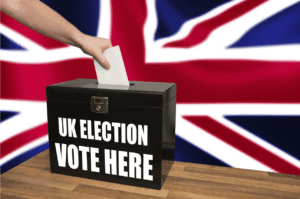
In the lead-up to the United Kingdom’s general election scheduled for 4 July, a new poll commissioned by The Wildlife Trusts reveals that a significant majority of the British public believe major political parties are falling short in addressing critical environmental issues. This sentiment highlights the growing importance of environmental policies among voters, emphasising the urgent need for political parties to prioritise nature and climate crises in their agendas.
The top 5 priorities identified by the respondents were:
- Protecting nature
- Halving river pollution by 2030
- Upgrading the energy efficiency of homes
- Help farmers reduce their emissions
- Providing more money to support nature-friendly farming
These findings underscore the public’s demands for stronger and more effective environmental action from their leaders. The public now more than ever are aware of environmental issues.
A history of environmental regulatory failures
Previous blogs and our recent report highlighted the stark decline in enforcement actions by the various environment agencies throughout the UK. For instance, in 2023 the enforcement action taken by the Environment Agency was at 12% the level it was in 2010. This decline must be seen within the context of austerity and dramatic cuts to budget and resources, leaving environment agencies overextended amid an environmental crisis. This means that key areas such as water pollution, chemical pollution, air pollution and habitat protection are all severely under-regulated, resulting in a rapid decline in the health of our environment.
What the manifestos are saying
Each party has published their manifesto. These will now be briefly examined in turn to see what each of the key parties (Conservative, Labour, Liberal Democrats and the Green Party) are saying about the environment.
Conservative
The Conservative party aim to put the Global Ocean Treaty into UK law, meaning that our oceans will be better protected. However, they have no real plan to stop the sewage crisis. They do intend to ban executive bonuses if a water company has committed a serious criminal offence. Moreover, they also aim to ban new incinerators. At the same time they also want to issue more oil and gas licences and have no meaningful plan to boost nature protections.
Labour
One of Labour’s strengths on the environment is the promise of not granting any new oil and gas licences. They also have plans for green homes and transitioning to renewable energy sources. Moreover, they plan to set up a publicly-owned clean power company, which would be paid for by a windfall tax on oil and gas corporations. However, their plan on tackling the sewage crisis does not go far enough. They also do not promise enough action on plastic pollution or industrial fishing.
Liberal Democrats
The Liberal Democrats have detailed plans for stopping the sewage crisis, along with plans for tackling pollution and emissions from private jets. They intend to set meaningful and binding environmental targets, such as doubling the size of the Protected Area Network to protect more of the UK’s important habitats. Moreover, they intend to make public transport cheaper, which supports the transition to net zero. However, they are unclear on allowing new oil and gas licences and have vague plans on ocean protection.
The Green Party
The Green Party is ambitious when it comes to investment in renewables, insulating people’s homes so that they are more energy efficient and warmer, sustainable farming and green transport. They have detailed plans for both tackling the sewage crisis and transitioning away from polluting industries. However, while they have these credible plans, they are unclear on how they would help the poorest households deal with high energy bills.
The general election in the era of an environmental crisis
Each party’s approach to environmental and climate issues has its limitations. The Conservative Party and the Labour Party do not go far enough in addressing the problem of sewage pollution. In contrast, the Liberal Democrats and the Green Party have set out much clearer plans for tackling sewage pollution. However, all parties need to be more aggressive with their plans for the environment and climate.
The public’s dissatisfaction with current efforts to address river pollution, biodiversity loss, climate change, sustainable agriculture, and community engagement reflects a demand for more robust and effective policies. Political parties must respond to these concerns with concrete, actionable plans to secure voter support and, more importantly, to safeguard the future of the planet. We need a leader who will help the environment not just survive but thrive.